Don't fear, this is Uganda - SIT Study Abroad: Uganda - Post-Conflict Transformation Past Review
By Madison S (Comparative Literature and Cultural Studies, Franklin College Switzerland) - abroad from 02/03/2013 to 05/18/2013 with
SIT Study Abroad: Reviews from Former Locations
When you arrive in Gulu, you are given an Acoli name; mine was Lanyero, meaning laughter and joy. That name paved my way through the most beautiful and challenging journey of my life, meeting extraordinary individuals and hearing their stories, bouncing over treacherous African roads, and witnessing post-conflict transformation in Northern Uganda firsthand. I learned a new language, made lasting friendships (both with locals and with my fellow students), and fell in love with the host country and its culture. Everything about this program is remarkable, from the administration to the curriculum. When you leave, you won't only have a new name, but new vision.
Review Photos
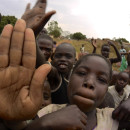
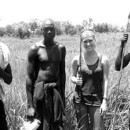
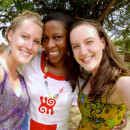
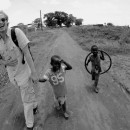
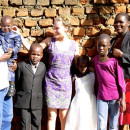
Personal Information
| How much international exposure did you have prior to this program? | 6 months+ |
Review Your Program
|
* Overall educational experience
Academic rigor, intensity, resources, etc. |
This study abroad program wholeheartedly embraces the philosophy of "the world is your classroom." Almost all of the learning was experiential. For language learning, we were placed in host families and sent out to interact with local communities starting in the first week of the trip. The rest of our classes were taught by lecturers from all over Uganda whose specific expertise broadened and enriched our field of knowledge. All of the academics were supported by site visits and opportunities to contextualize the information in a hands-on, practical setting. The courses were rigorous in content, but it was not difficult to do well if you put in the effort, and requirements weren't ridiculously stringent. The only class that could have used a bit of improvement was the language study in Acoli, but it is certainly possible to be proficient in the local language by the time the semester is up, if you put your own work into it. Due to the excellent connections of the program staff, resources for independent research were never in short supply and program lecturers were often willing to put in extra time for our benefit. I learned more during this semester than in any other part of my educational career! |
|
* Host Country Program Administration
On-site administration of your program |
This program recently underwent a change of management, and the new administration could not be better. Their expertise, connections, and enthusiasm were the cornerstones of this program. As well as being competent and knowledgeable, they became our family in Uganda, always there for whatever kind of support we needed. |
|
* Housing:
How satisfied were you with your living arrangements? |
During most of the trip (starting the second week), we stayed with host families in Gulu. This was one of the most rewarding parts of the trip for me, as I became very close with my host family (mother, father, and four siblings). They treated me as another member of the family, making me feel safe, welcome, and at home for the entire time I stayed there. I will maintain a lifelong relationship with them, and hope to go back and stay with them again sometime soon. The neighborhood I was in was also a good place to be; it generally felt safe enough but was not in the wealthy part of town, so I got a more authentic experience. The house was comfortable and I did have my own room (curtained off), though this is not a guarantee. Also, don't necessarily expect running water or reliable electricity, this is just part of the way of life in most of Northern Uganda! We also had a rural homestay, where we spent a week living in huts with rural families. I also had a fantastic time during this part of the trip, but again, don't expect amenities. Still, it was another standout part of the trip. When we were not in homestays, we were in hotels or hostels, all of which were nice per Ugandan standards, with clean beds, mosquito nets and sometimes running water. We usually stayed in double rooms. During the independents study, it is sometimes difficult to find housing in Gulu outside of hotels (unless you opt to live with your host family, which may be a possibility). I left Gulu during my ISP, so I didn't experience this, but I stayed in relatively sparse hotels or in temporary homestays in more rural parts of Uganda. My hosts were always generous and welcoming, and despite some material hardships I was generally very happy with my living arrangements. |
| * Food: |
I generally really liked Ugandan food, though it was not universally popular with my group, and it doesn't remotely resemble an American diet. Breakfast is generally not a large meal, just tea and bread or chapati (an Indian flatbread). A typical lunch or evening meal consists of a starch - usually rice, local potatoes, cassava or a "pasted" food: a thick mix of cornmeal (posho) or millet flour (kwon kal) - plus a sauce, generally using beans, eggs, meat (goat, most often), or groundnuts, a staple food of the region. They also serve local green vegetables, sauces made with peas, plantains, sesame sauces and other dishes. Fried white ants and grasshoppers are another local delicacy, don't miss them! The north of Uganda is a fertile agricultural region, so generally the food is very fresh. Still, it does take getting used to, but keep an open mind! You will definitely not go hungry (you're more likely to suffer the opposite fate of too many meals from too many hospitable people). When you're craving something from home, there is muno (foreigner) food available, but it's definitely the most expensive around. It's easy to eat on a budget if you eat local food. |
|
* Social & Cultural Integration:
How integrated did you feel with the local culture? |
I felt very integrated with the local culture by the end, but this is not necessarily a given of the program. The opportunities exist if you take advantage of them: do your best to get some language skills and use them, spend time with your host family and their friends, travel outside Gulu to the rural regions if you have the chance, and make a point to seek out local friends (though be careful of the overly friendly type... white foreigners are sometimes seen as wealthy and occasionally you run into people with ulterior motives). The Independent Study Period at the end of the program was when I really felt the most integrated, because I spent most of it away from the group and in a rural setting where very little English was spoken. Making the effort to reach out was extremely valuable to me, and I've made close friends in Uganda I'll definitely keep in touch with. |
|
* Health Care:
How well were health issues addressed during the program? |
The program handled any health issues very competently, and there was generally access to some kind of medical care if necessary. That said, this is a low-income country on the equator that has had many problems with diseases. Malaria prophylaxis is a must, as are a number of vaccines (including Yellow Fever, Typhoid, etc). Don't expect the same kind of healthcare you would get at home, and DO expect to most likely get sick at some point. We didn't have any health problems on our trip that couldn't be dealt with at the local hospitals, and the doctors were usually competent, so don't let health concerns dissuade you from going on a program like this. Just be aware and take precautions, and you can trust the program staff to know what they're doing and keep you safe. |
| * Safety: |
Although it's situated in the war-torn north of the country and is infamous for being the epicenter of the conflict between the government and the LRA, Gulu is actually a safer city than Kampala. Being smaller and more navigable, Gulu generally felt quite safe, and I never worried about walking around by myself as a girl while it was light. At night, we were sure to walk in pairs at least and try to have a guy with us whenever possible. There were a few times when our safety felt a little dubious, but usually acting in common sense was enough to avoid trouble. There are definitely certain areas of town (certain bars, etc.) to avoid for safety reasons, and the program staff points these out at the beginning of the trip, but as long as you are aware and a little cautious, Uganda is a safe and welcoming place to be. |
| If you could do it all over again would you choose the same program? |
Yes
|
Finances
|
* Money: How easily were you able to live on a student's budget?
(1 = not very easy/$200+ on food & personal expenses/week, 2.5 = $100/week, 5 = very easily/minimal cost) |
Gulu is very cheap. The program often provides a stipend for meals that are not taken with the group, and otherwise most meals are with the host family, so there are few necessary expenditures. The further you get away from town centers, the less expensive things are as well. During my Independent Study Period in Nwoya district, I could get a whole week's meals for under $5. |
| Not including program expenses, about how much money did you spend on food and other expenses each week? | In total, I spent around $300 for the entire semester, including gifts and all other expenses. |
| Do you have any general money-saving tips for future study abroad participants? | Eat local food (though be wary of street food) and buy goods at the local market, where things are cheaper. Also, if you go to the tailor to get clothes made (and I recommend you do), ask your host mother or sisters to take you the first time so they can introduce you to a good tailor and show you which fabrics are the better quality and will soften when washed. You'll also avoid muno prices that way. |
Language
| * Did your program have a foreign language component? | Yes |
|
How much did the program encourage you to use the language?
0 = No encouragement, 5 = frequent encouragement to use the language |
There was quite a lot of encouragement to learn the language, though because the host country's official language was English, language learning really depended on whether or not you were willing to put in the extra effort. |
| How would you rate your language skills at the beginning of the program? | None |
| How would you rate your language skills at the end of the program? | Intermediate |
| What was the highest level language course you had completed prior to departure? | none |
| How many hours per day did you use the language? | |
| Do you have any tips/advice on the best ways to practice the language for future study abroad participants? | Spend time talking to your host family in Acoli. They will probably try to speak to you in English, but definitely insist that they interact with you some in Acoli. They will be thrilled if you try (my host mother was extremely proud of my Acoli skills) and more than willing to help you out. It's also a good opportunity to ask about the culture and get to know your family better. Talk to kids in Acoli as well, it sends them into fits of giggles to see a muno speaking Acoli. Use your rural homestay as a chance to improve your language skills, as levels of English there will be lower. Ultimately, just don't be afraid to speak in Acoli! Even if you get it wrong, you'll see that people's whole demeanor changes when you approach them in their own language. |
Other Program Information
|
* Where did you live?
Select all that apply |
|
|
* Who did you live with?
Select all that apply |
|
|
* Who did you take classes with?
Select all that apply |
|
| About how many local friends did you make that you will likely keep in touch with? |
A Look Back
| * What did you like most about the program? |
|
| * What could be improved? |
|
| * What do you know now that you wish you knew before going on this program? | I wish I had access to more Acoli language resources so that I could have practiced more before the trip! |
Reasons For Studying Abroad
| To help future students find programs attended by like-minded individuals, please choose the profile that most closely represents you. |
The Nearly Native or Trail BlazerCraving the most authentic experience possible, perhaps you lived with a host family or really got in good with the locals. You may have felt confined by your program requirements and group excursions. Instead, you'd have preferred to plan your own trips, even skipping class to conduct your own 'field work.' |








